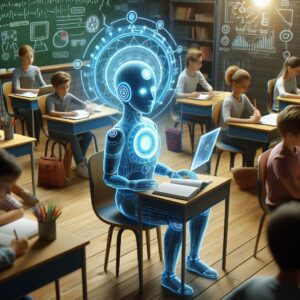Introduction:
In the rapidly evolving landscape of education, Artificial Intelligence (AI) has emerged as a transformative force, reshaping traditional teaching methods and offering a more personalized approach to learning. By harnessing the power of AI, educational institutions are unlocking the potential for tailored and adaptive learning experiences that cater to individual needs and preferences. In this article, we explore the profound impact of AI on education, specifically focusing on how it is fostering personalized learning experiences.
Understanding Personalized Learning with AI:
Personalized learning goes beyond the one-size-fits-all model of traditional education. AI algorithms analyze vast amounts of data, including students’ learning styles, preferences, and performance metrics, to tailor educational content and experiences to individual needs. This approach acknowledges that every student learns differently and allows for a more customized and effective learning journey.
Adaptive Learning Platforms:
AI-powered adaptive learning platforms are at the forefront of personalized education. These platforms use algorithms to continuously assess a student’s progress, understanding their strengths and weaknesses. Based on this analysis, the system adjusts the difficulty level of content in real-time, ensuring that students receive challenges that are neither too easy nor too difficult. This adaptability fosters a dynamic learning environment that keeps students engaged and motivated.
Individualized Learning Paths:
AI enables the creation of individualized learning paths, taking into account students’ unique learning paces and preferences. Whether a student excels in mathematics but struggles with language arts, or vice versa, AI algorithms can identify these areas and tailor the curriculum accordingly. This level of customization ensures that students receive targeted support.
Smart Tutoring Systems:
AI-powered tutoring systems act as virtual guides, offering personalized assistance to students. These systems can provide real-time feedback, answer questions, and offer additional resources based on a student’s specific learning trajectory. Smart tutoring systems not only supplement classroom learning but also create a supportive environment for students.
Data-Driven Insights for Educators:
AI in education doesn’t just benefit students; it also provides valuable insights for educators. By analyzing data generated from student interactions with educational platforms, AI can help teachers identify patterns, assess the effectiveness of instructional strategies. This collaborative approach empowers educators to refine their practices for better outcomes.
Overcoming Educational Barriers:
AI-driven personalized learning has the potential to address educational barriers and promote inclusivity. By adapting content to diverse learning styles and accommodating different paces of learning, AI fosters an environment. This inclusivity contributes to breaking down traditional educational barriers and providing equal opportunities for all learners.
Conclusion:
AI in education is ushering in a new era of personalized learning experiences, revolutionizing how knowledge is imparted and acquired. By tailoring educational content to individual needs, adaptive learning platforms, smart tutoring systems, and data-driven insights are transforming classrooms into dynamic and inclusive spaces. As AI continues to evolve, its role in education promises to enhance the learning journey for students.
For more Article like this, visit our Website Here

